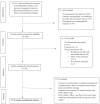Education modalities for serious illness communication training: A scoping review on the impact on clinician behavior and patient outcomes
- PMID: 37424275
- PMCID: PMC10865772
- DOI: 10.1177/02692163231186180
Education modalities for serious illness communication training: A scoping review on the impact on clinician behavior and patient outcomes
Abstract
Background: Several clinician training interventions have been developed in the past decade to address serious illness communication. While numerous studies report on clinician attitudes and confidence, little is reported on individual education modalities and their impact on actual behavior change and patient outcomes.
Aim: To examine what is known about the education modalities used in serious illness communication training and their impact on clinician behaviors and patient outcomes.
Design: A scoping review using the Joanna Briggs Methods Manual for Scoping Reviews was conducted to examine studies measuring clinician behaviors or patient outcomes.
Data sources: Ovid MEDLINE and EMBASE databases were searched for English-language studies published between January 2011 and March 2023.
Results: The search identified 1317 articles: 76 met inclusion criteria describing 64 unique interventions. Common education modalities used were: single workshop (n = 29), multiple workshops (n = 11), single workshop with coaching (n = 7), and multiple workshops with coaching (n = 5); though they were inconsistently structured. Studies reporting improved clinician skills tended to be in simulation settings with neither clinical practice nor patient outcomes explored. While some studies reported behavior changes or improved patient outcomes, they did not necessarily confirm improvements in clinician skills. As multiple modalities were commonly used and often embedded within quality improvement initiatives, the impact of individual modalities could not be determined.
Conclusion: This scoping review of serious illness communication interventions found heterogeneity among education modalities used and limited evidence supporting their effectiveness in impacting patient-centered outcomes and long-term clinician skill acquisition. Well-defined educational modalities and consistent measures of behavior change and standard patient-centered outcomes are needed.
Keywords: Education; clinical competence; health communication; medical; palliative care; patient reported outcome measures.
Conflict of interest statement
Declaration of conflicting interestsThe author(s) declared no potential conflicts of interest with respect to the research, authorship, and/or publication of this article.
Figures
Similar articles
-
Beyond the black stump: rapid reviews of health research issues affecting regional, rural and remote Australia.Med J Aust. 2020 Dec;213 Suppl 11:S3-S32.e1. doi: 10.5694/mja2.50881. Med J Aust. 2020. PMID: 33314144
-
The effectiveness of internet-based e-learning on clinician behavior and patient outcomes: a systematic review protocol.JBI Database System Rev Implement Rep. 2015 Jan;13(1):52-64. doi: 10.11124/jbisrir-2015-1919. JBI Database System Rev Implement Rep. 2015. PMID: 26447007
-
Promoting and supporting self-management for adults living in the community with physical chronic illness: A systematic review of the effectiveness and meaningfulness of the patient-practitioner encounter.JBI Libr Syst Rev. 2009;7(13):492-582. doi: 10.11124/01938924-200907130-00001. JBI Libr Syst Rev. 2009. PMID: 27819974
-
Artificial intelligence technologies and compassion in healthcare: A systematic scoping review.Front Psychol. 2023 Jan 17;13:971044. doi: 10.3389/fpsyg.2022.971044. eCollection 2022. Front Psychol. 2023. PMID: 36733854 Free PMC article.
-
Interventions to change clinicians' behavior related to suicide prevention care in the emergency department: a scoping review.JBI Evid Synth. 2022 Mar 1;20(3):788-846. doi: 10.11124/JBIES-21-00149. JBI Evid Synth. 2022. PMID: 34907133
Cited by
-
Implementing palliative care education into primary care practice: a qualitative case study of the CAPACITI pilot program.BMC Palliat Care. 2023 Sep 28;22(1):143. doi: 10.1186/s12904-023-01265-7. BMC Palliat Care. 2023. PMID: 37759200 Free PMC article.
-
E-Learning to Fill Gaps in Serious Illness Communication Education: A Missing Piece or an Unfinished Puzzle?Palliat Med Rep. 2025 Feb 3;6(1):50-52. doi: 10.1089/pmr.2025.0004. eCollection 2025. Palliat Med Rep. 2025. PMID: 40151520 Free PMC article. No abstract available.
-
Interpersonal energy: New and bold directions in palliative care health professions education research.Palliat Med. 2024 Feb;38(2):166-169. doi: 10.1177/02692163231219949. Epub 2024 Jan 24. Palliat Med. 2024. PMID: 38268060 Free PMC article. No abstract available.
References
-
- Sanders JJ, Paladino J, Reaves E, et al.. Quality measurement of serious illness communication: recommendations for health systems based on findings from a symposium of national experts. J Palliat Med 2020; 23: 13–21. - PubMed
-
- Zaman M, Espinal-Arango S, Mohapatra A, et al.. What would it take to die well? A systematic review of systematic reviews on the conditions for a good death. Lancet Health Longevity 2021; 2: e593–e600. - PubMed
Publication types
MeSH terms
LinkOut - more resources
Full Text Sources
Research Materials
Miscellaneous


